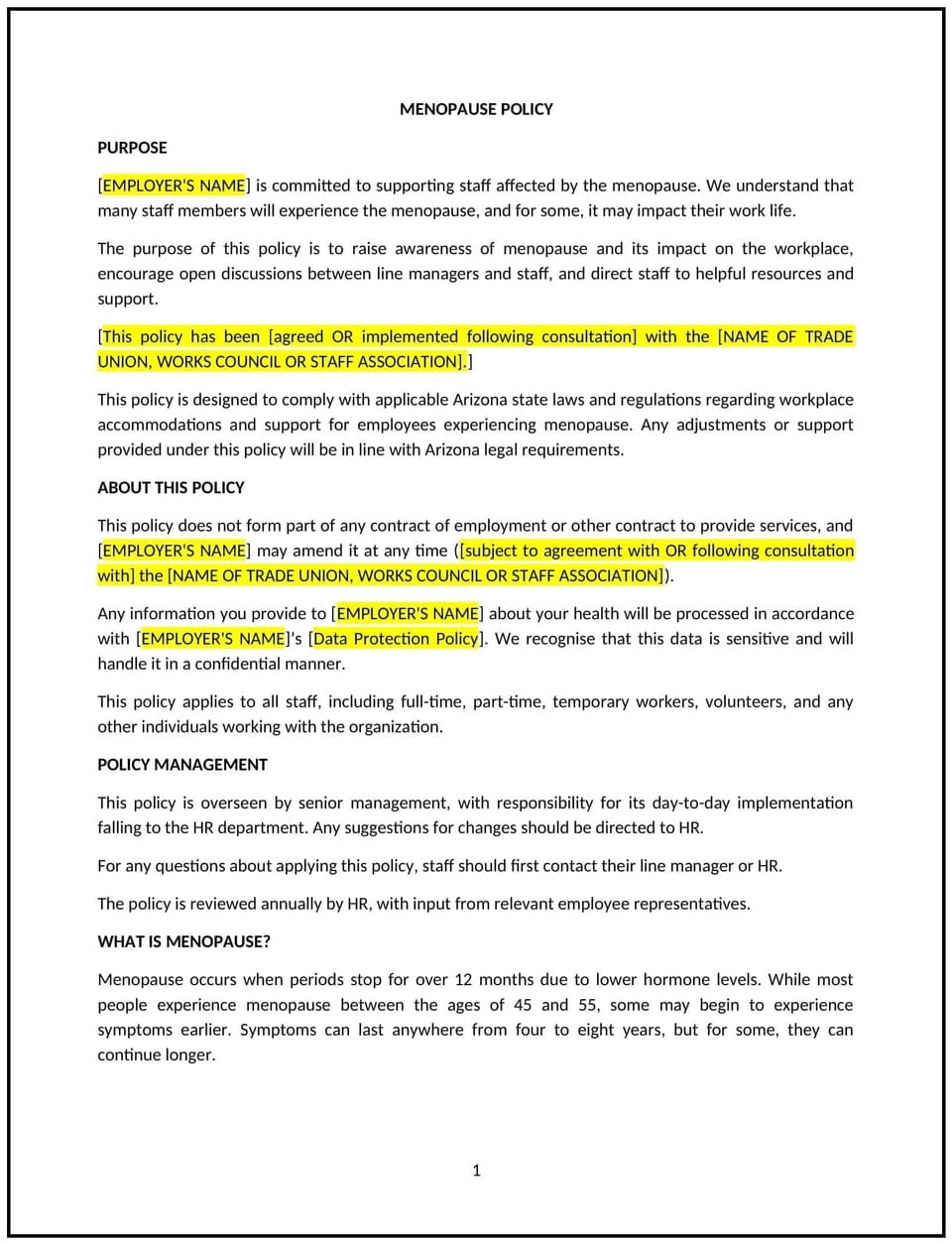Menopause policy (Arizona): Free template

Menopause policy (Arizona)
In Arizona, a menopause policy provides businesses with guidelines to support employees experiencing menopause symptoms in the workplace. This policy fosters an inclusive environment and helps reduce stigma while promoting employee well-being and productivity.
This policy outlines accommodations, communication strategies, and procedures for addressing workplace challenges related to menopause. By implementing this policy, Arizona businesses can demonstrate their commitment to employee health and inclusivity.
How to use this menopause policy (Arizona)
- Raise awareness: Provide information to employees and managers about menopause, its symptoms, and its potential workplace impact.
- Offer reasonable accommodations: Include options such as flexible schedules, access to temperature-controlled areas, and adjustments to workload when needed.
- Encourage open communication: Create a supportive environment where employees feel comfortable discussing their needs with HR or managers.
- Train managers: Equip supervisors with the knowledge to address menopause-related concerns respectfully and effectively.
- Review workplace practices: Ensure policies and procedures align with employee needs, promoting a supportive and inclusive environment.
Benefits of using a menopause policy (Arizona)
This policy offers several advantages for Arizona businesses:
- Promotes inclusivity: Demonstrates the company’s commitment to supporting employees’ health and well-being.
- Enhances productivity: Helps employees manage symptoms effectively, reducing absenteeism and performance issues.
- Builds trust: Encourages open dialogue, fostering a culture of understanding and respect.
- Reduces stigma: Raises awareness and normalizes discussions about menopause in the workplace.
- Supports compliance: Aligns with anti-discrimination laws, reducing legal risks associated with gender or age-related claims.
Tips for using a menopause policy (Arizona)
- Address Arizona-specific considerations: Consider environmental factors, such as high temperatures, which may exacerbate menopause symptoms, and provide suitable accommodations.
- Incorporate wellness programs: Offer resources such as counseling, health workshops, or access to employee assistance programs (EAPs).
- Provide private spaces: Ensure access to private areas for breaks or symptom management when needed.
- Regularly review: Update the policy to reflect evolving workplace needs or advancements in employee wellness practices.
- Promote awareness: Include menopause-related topics in diversity, equity, and inclusion (DEI) initiatives to further reduce stigma.
Q: What accommodations can businesses offer employees experiencing menopause?
A: Businesses can provide flexible schedules, temperature-controlled workspaces, access to wellness programs, and workload adjustments to support affected employees.
Q: How should managers address menopause-related concerns?
A: Managers should foster open and supportive communication, offer reasonable accommodations, and maintain confidentiality when addressing employee concerns.
Q: How can businesses raise awareness about menopause in the workplace?
A: Businesses can organize training sessions, include menopause discussions in wellness programs, and share resources to educate employees and reduce stigma.
Q: Are there legal risks associated with not supporting employees experiencing menopause?
A: Yes, failing to accommodate or address menopause-related concerns could lead to claims of discrimination based on gender, age, or health conditions.
Q: How does this policy support compliance with Arizona and federal laws?
A: The policy aligns with anti-discrimination laws, ensuring that employees are treated fairly and supported in the workplace.
This article contains general legal information and does not contain legal advice. Cobrief is not a law firm or a substitute for an attorney or law firm. The law is complex and changes often. For legal advice, please ask a lawyer.


